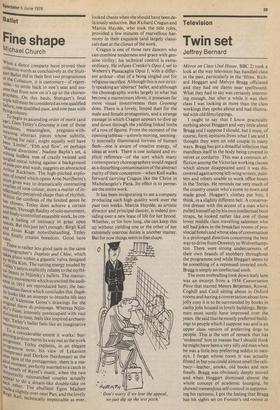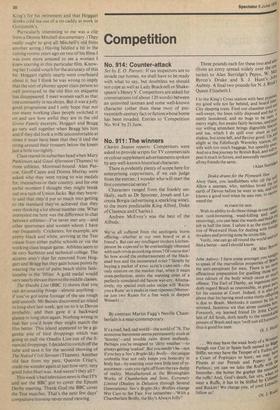Television
Twin set
Jeffrey Bernard
Mirror on Class (2nd House, BBC 2) took a look at the way television has handled class in the past, particularly in the 'fifties. Richard Hoggart and Melvyn Bragg officiated and they had me damn near spellbound. What they had to say was certainly interesting enough, but after a while it was their class I was looking at more than the class workings they spoke about and had illustrated with old film clippings.
I ought to say that I know practically nothing about Hoggart and very little about Bragg and I suppose I should, but I must, of course, form opinions from what I see and I thought they were an odd couple in many ways. Bragg has got a dreadful infection that manifests itself in the body being covered in velvet or corduroy. This was a common affliction among the Victorian working classes which almost disappeared until it was discovered again among left-wing writers, painters and others unable to work office hours in the 'forties. He reminds me very much of the country cousin who's come to town and made good. Hoggart's clothes put him, I think, in a slightly different belt. A conservative dresser with the accent of a man who's pulled himself up by his own intellectual boot straps, he looked rather like one of those lower middle class travelling salesmen who tell bad jokes in the breakfast rooms of provincial hotels and whose idea of conversation is a prolonged direction concerning the best way to drive from Oswestry to Wolverhampton. There were strong undercurrents of their own brands of snobbery throughout the programme and while Hoggart seems to be something of a repressed inverted snob, Bragg is simply an intellectual snob.
The most enthralling look down leafy lane was an excerpt from a 1954 Conversation Piece that starred Messrs Betjeman, Rowse, Coghill and Cecil sitting about in Oxford rooms and having a conversation about how jolly cosy it is to be surrounded by books in cushy jobs housed in lovely buildings. Betjeman must surely have improved over the years. He said that he mostly preferred buildings to people which I suppose was and is an upper class version of preferring dogs to people. This is the sort of remark that has 'endeared' him to masses but I should think
he might have been a very silly old man when he was a little boy preferring teddys to nan nys. I forget whose room it was actually filmed in but you could almost smell the celibacy—leather, smoke, old books and new fossils. Bragg was obviously deeply moved and when Hoggart dismissed almost the whole concept of academic lounging, he showed tremendous self-control in suppressing his rattiness. I got the feeling that Bragg has his sights set on Forster's old rooms at
King's for his retirement and that Hoggart drinks cold tea out of a tin caddy at work in Goldsmith's.
Particularly interesting to me was a clip from a Dennis Mitchell documentary. (They , really ought to give all Mitchell's old films another airing.) Having fiddled a bit in the cutting rooms years ago on two of his films I was even more amazed to see a woman I knew starring in this particular film. Know ing her I could vouch for the accuracy of this bit. Hoggart rightly nearly went overboard about it, but I think he was wrong to imply that the sort of phoney upper class person so well portrayed in the old film on etiquette has disappeared. I meet women such as that one constantly in tea shops. But it was a jolly good programme and I only hope that not too many working class people switched it on and saw how awful they are in the old Grove Family excerpts. Hoggart and Bragg go very well together when Bragg lets him and if they did look a trifle uncomfortable at times it must have been that they'd tied the string around their trousers below the knees just a little too tightly.
Class reared its suburban head when Mary Parkinson said Good Afternoon (Thames) to three athletes, Montreal-bound. Alan Pascoe, Geoff Capes and Donna Murray were asked who they were trying to win medals for, themselves or their country, and for one awful moment I thought they might break out in a rash of Union Jacks. But they bravely said that they'd put so much into getting to the standard they've achieved that they were thinking a lot about number one. What interested me here was the difference in chat between athletes—I've never met any—and other sportsmen and women whom I have met frequently. Cricketers, for example, are pretty black and white, arriving at the Test crease from either public schools or via the working class league game. Athletes seem to he very Surbiton and technical college. The accents aren't that far removed from Hoggart and Bragg but they gain house points by wearing the sort of palm beach shirts fashionable in the 'fifties. A gold medal would very nearly elevate them to the middle classes.
The Onedin Line (BBC I) shows that you can do amazing things—almost anything— if you've got some footage of the sea rough and smooth. Mr Baines discovered an island in long shot last week, got on to it in Devon probably, and then gave it a backward glance in long shot again. Nothing wrong in that but you'd hope they might match the film better. This island appeared to be a gi gantic pile of bird droppings which was going to pull the Onedin Line out of the fi nancial droppings. I decided to switch off the tube and save it for the second showing of The Naked Civil Servant (Thames). Another old face from my past, Quentin Crisp's, made me wonder again at just how very, very good John Hurt was. And weren't they all ? This week's bad television news is that ITV and not the BBC got to cover the Epsom Derby meeting. Thank God the BBC cover the Test matches. That's the next few days' compulsive listening never mind viewing.



































 Previous page
Previous page